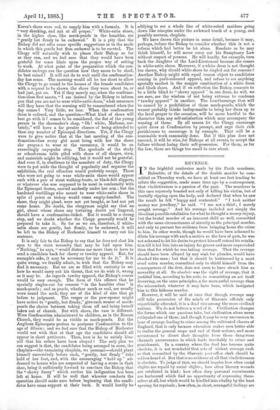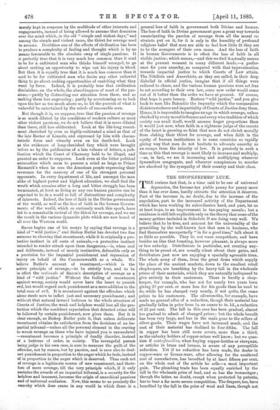REVENGE.
IN the frightful confession made by tWe Pesth murderer, Balentits, of the details of the double murder he committed on Thursday week, we have at least one fact tending to
refute the suggestion, made some time ago by a contemporary, that vindictiveness is a passion of the past. The murderer in this case expressly boasted not only of killing his victim, but of brutally ripping open the body, and declared that when he saw the result he felt "happy and contented." "I took neither money nor jewellery," he said. " I am not a thief ; I merely
sought revenge." And his revenge included not simply the bloodiest possible retaliation for what he thought a money-injury, but the brutal murder of an innocent child as well, committed with the same circumstances of atrocity as the principal murder, and only to prevent her evidence from bringing home the crime to him. In other words, though he would have been ashamed to dilute his revenge with such a motive as the love of gain, he was not ashamed to let his desire to protect himself extend his retaliation till it led him into an injury far graver and more unprovoked than that for which he was taking revenge. That the revenge should have been alloyed by any wish for plunder, would have shocked the man ; but that it should be buttressed by a most cruel extra murder, committed only to shield himself from the consequences of the first, does not seem to have struck him as unworthy at all. So absolute was the right of revenge, that it justified him, according to his code, in committing an act itself deserving, on the same principles, a far more awful revenge than the misconduct, whatever it may have been, which instigated him to this hideous murder.
However, it will be said at once that though revenge may still take possession of the minds of Slavonic officials only superficially educated, it is a dead vice among the more civilised nations. We do not believe a word of it. Civilisation changes the forms which our passions take, but civilisation alone never extirpated one of them; and though it may be very uncommon to hear of revenge leading to crime among the cultivated classes of England, that is only because education makes men better able to realise the general scope and end of their actions, and more accustomed to divert their thoughts from those dangerous channels perseverance in which leads inevitably to crime and punishment. In a country where the duel has become quite obsolete, it is not wonderful that acts of violent revenge such as that committed by the Slavonic post-office clerk should be seldom heard of. But that is no evidence at all that vindictiveness is obsolete. To judge of that, we should inquire how often social slights are repaid by social slights ; how often literary wounds are retaliated in kind ; how often deep personal resentments are harboured which find no opportunity of expressing themselves at all, but which would be kindled into vitality by the least opening for reprisals ; how often, in short, revengeful feelings are merely kept in suspense by the multitude of other interests and engagements, instead of being allowed to assume that dominion over the mind which, in the old " simple and violent days," and among the simple and violent races, the thirst for revenge used to assume. Doubtless one of the effects of civilisation has been to produce a complexity of feeling and thought which is by no means favourable to the absolute sway of single passions. It is perfectly true that it is very much less common than it used to be for a cultivated man who thinks himself wronged, to go about seeking an opportunity to wipe out his injury in blood. But then it is equally true that it is much less common than it used to be for cultivated men who desire any other unlawful thing to go about seeking opportunities of snatching what they want by force. Indeed, it is probably true that civilisation diminishes, on the whole, the absorbingness of most of the passions,—partly by distracting our attention from them, and so making them less engrossing ; partly by accustoming us to look upon the law as too much above us, to let the pursuit of what is unlawful be entertained by the minds of reasonable men.
But though it is, we suppose, true that the passion of revenge is as much diluted by the conditions of modern culture as most other violent passions, we do not believe that it is more diluted than these, still less obliterated. Look at the life-long resentment cherished by even so highly-cultivated a mind as that of the late Rector of Lincoln, and expressed by him with characteristic force and vivacity even on his death-bed. Look at the evidences of long-cherished fury which were brought before us by the publication of a late volume of letters, a publication which the Court of Chancery held to be illegal, and granted an order to suppress. Look even at the bitter political animosities which seem to possess a mind as large as Prince Bismarck's when he sees the American people expressing their reverence for the memory of one of his strongest personal opponents. In every department of life, and amongst the men alike of highest power and highest education, we shall find the wrath which remains after a long and bitter struggle has been terminated, at least as living as any one human passion can be expected to be in a world so full of distractions and complexity of interests. Indeed, the loss of faith in the Divine government of the world, as well as the loss of faith in the human Governments of the world, which so curiously mark this epoch, have led to a remarkable revival of the thirst for revenge, and we see the result in the various dynamite plots which are now heard of all over the Western world.
Bacon begins one of his essays by saying that revenge is a kind of " wild justice ;" and Bishop Butler has devoted two fine sermons to showing that resentment, while it is originally a protective instinct in all sorts of animals,—a protective instinct intended to render attack upon them dangerous,—is, when cool and deliberate, instead of merely instinctive, defensible only as a provision for the impartial punishment and repression of injury on behalf of the Commonwealth as a whole. We believe Butler's account of resentment, —which is the active principle of revenge,—to be strictly true, and to be in effect the rationale of Bacon's description of revenge as a kind of "wild justice." Without the feeling of resentment against wrong, society would never have the heart to punish evil, but would regard such punishment as a mere addition to the total sum of evil. It is resentment against the offenders which alone steels men to inflict just and necessary punishment; and without that natural inward buttress to the whole structure of Courts of Justice, the weak and helpless would lose all the protection which the confident expectation that detected crime will be followed by certain .punishment, now gives them. But it is clear enough, as Bishop Butler puts it, that unless deliberate resentment obtains its satisfaction from the decisions of an impartial tribunal—unless all the personal element in the craving to wreak revenge on those who have injured you is surrendered —resentment becomes a principle of deadly disorder, instead of a buttress of order, in society. The revengeful person being judge in his own case, is sure to measure the guilt of the offender, not by reason, but by passion, and is sure also, to dealout punishment in proportion to the anger which he feels, instead of in proportion to the anger which is deserved. Thus each act of revenge is a legitimate source of new resentment,-and therefore of more revenge, till the very principle which, if it only sustains the awards of an impartial tribunal, is a security for the helpless and innocent, becomes the origin of anarchical passions and of universal confusion. Now, this seems to us precisely the anarchy which does ensue in any world in which there is a
general loss of faith in government both Divine and human. The loss of faith in Divine government goes a great way towards emancipating the passion of revenge from all the moral restraints put on it, for it is only in the humility of profound religious belief that men are able to feel how little fit they are to be the avengers of their own cause. And the loss of faith in human Governments is in effect the loss of faith in all visible justice ; which means,—and this we find it actually means at the present moment in many different lands,—a preference for pure anarchy, as compared with that 'approximation towards impartial justice to which Courts of Law attain. The Nihilists and Anarchists, as they are called, in their deep disbelief in official justice, imagine that if all things were reduced to chaos, and the various human passions were set free to act according to their own law, some new order would come out of it better than the order we have at present. Of course, that hope is pure lunacy. Restore "wild justice," and you give back to men like Balentits the impunity which the comparative disinterestedness and impartiality of Courts of Justice deny them. Hence, it is impossible to imagine an age in which revenge, unless checked by every'moral influence and every wise tradition of which society can avail itself, would assume huger proportions than it would just now, when faith in a righteous judge of the secrets of the heart is growing so faint that men do not shrink morally from slaking their thirst for revenge, and when faith in the equity of human institutions is in some countries so rapidly giving way that 'men do not hesitate to advocate anarchy as an escape from the iniquity of law. It is precisely in such a time as this that revenge is most likely to increase and multiply, —as, in fact, we see it increasing and multiplying wherever dynamiters congregate, and wherever conspirators to murder are absolved by the sympathy of their country and their class.



































 Previous page
Previous page